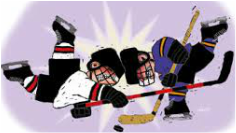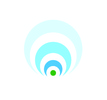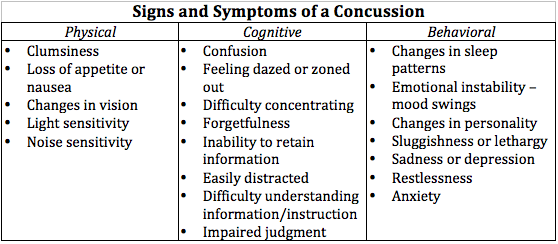
Most players, coaches and parents are aware of the major signs and symptoms of a concussion (loss of consciousness, vomiting, loss of memory, etc.) but are often unaware of the more subtle signs and symptoms of concussion. Fewer people still are aware that the signs and symptoms of a concussion can take hours or even days to manifest.
Things I have learned about concussions
1. Any violent, jarring motion can result in concussions
Concussions can be caused by more than just direct blows to the head. Anything that causes the brain to be shaken or bounce around in the skull can result in a concussion – think of: whiplash; players colliding together; or, flying through the air while tobogganing and landing with a thud.
With any contusion or bruise (a concussion is like a brain bruise) the full extent of an injury only becomes apparent once the body has responded to the initial trauma. In the brain this delayed neuroinflammatory response can be more damaging then the initial impact itself!
It is imperative that if there is any indication that the brain has been effected you behave ‘as if’ there is a concussion, even if the initial symptoms – like ‘seeing stars’, ringing the ears, or loss of balance – lasted only a few seconds:
- Stop playing for the day
- Rest and monitor health for at least 24 hours, but especially during the first 3 hours.
Please ignore all advice to ‘shake-it-off’ or ‘get-back-at-it’.
3. Children and youth are at greater risk
Developing brains are more susceptible to damage, take longer to heal, and are more likely to suffer cumulative damage from repetitive injuries.
People under 18 are more likely to experience delayed onset of signs and symptoms is (from a delayed neuroinflammatory response) making rest and monitoring in the first 24 hours after an injury especially critical.
4. Symptoms maybe subtle – even with serious concussions
The obvious symptoms like headaches, vertigo or slurred speech are relatively easy to recognize and monitor. Many of the other symptoms are quite subtle and can be very hard to recognize – especially in children and youth. There are no definitive tests for concussions – like MRI or CT scans - diagnosis is based on changes in physical, cognitive and behavioral functions.
For a more complete list of concussion symptoms please visit Hockey Canada or one of the other links listed below.
With any injury, immediately seek medical help if there is:
- A headache that is getting worse
- Drowsiness or an inability to wake up
- Confusion or irritability
- Vomiting
- Seizures, uncontrolled twitching or jerking
- Loss of balance
- Slurred speech
- Weakness or numbness of the extremities
- Loss of memory
5. Concussions cause compound damage
Once you have had one concussion you are more likely to have another – think Sidney Crosby. To make things worse, the health effects can be cumulative.
Anyone who has sustained multiple concussions, or heals slowly from concussions should seriously consider avoiding all contact, collision and high risk sports or activities.
6. Rest = Recovery
The more you rest the faster you will recover. As hard as it may be to rest, if you return to activity while still concussed it can take 2-5 times longer to heal! For some people returning to activity too soon leads to an intensification of symptoms and an increased risk of another concussion.
Rest during a concussion means both physical & cognitive (thinking, concentrating, learning and reasoning) rest for as long as you are experiencing any symptoms. For adults the typical recovery period is between 3-10 days. Children and youth can take double that time to heal.
Try not to panic…cognitive rest includes eliminating screen time, you must avoid computers, cell phones and video games! This may sound impossible, but complete cognitive rest is required to heal your brain.
Slowly re-introduce activities in 5-15 minute intervals only once symptoms have significantly improved. Stop and rest if symptoms aggravate. As always – pay attention to your symptoms. Symptoms are the manifestation of your injury and a sign that your body still needs to heal and recover.
Avoid the use of any prescription or non-prescription medication without direct medical supervision – using headache medicine, pain killers and anti-inflammatories while concussed can cause serious complications.
7. Homeopathic Treatment can speed recovery
In my personal life and in my practice I have seen the correct homeopathic treatment substantially speed healing after concussions. I have even seen the resolution of lingering symptoms (tinnitus & vertigo) that were decades old!
With any trauma, and especially head traumas, the first treatment to consider is homeopathic Arnica*. In fact, Arnica* is so effective at reducing inflammation, pain and bruising that it is routinely prescribed by plastic surgeons to speed healing and recovery times. Arnica* is widely available in pellet form from most health food stores and many major grocery chains.
Arnica* is indicated post trauma if there is:
- Neurological issues
- Bruising
- Irritability – especially if the injured person insists that nothing is wrong & wants to be left alone
- Slow thinking, fogginess or confusion
- Stupor or delirium
- Falling in & out of sleep
- Aggravation from any exertion
If after a few days of treatment with Arnica* there lingering symptoms or healing is slow, seek help from me or your homeopathic practitioner. In addition to Arnica* there are many remedies that can help speed recovery time – the remedies must be selected based on the specific symptoms being experienced.
*Note - I am referring exclusively to a homeopathic versus a herbal preparation of Arnica.
Have fun, play safe and get outside – it is a winter wonderland!
Want to learn more?
Parachute: Concussion Toolkit
Sports Concussion Myths and Misconceptions
Sport-Related Concussion in Children and Adolescents
Pocket CONCUSSION RECOGNITION TOOL
SCAT3: Sport Concussion Assessment Tool – 3rd edition
Brainstreams: Concussion
Hockey Canada: Concussions



 RSS Feed
RSS Feed
